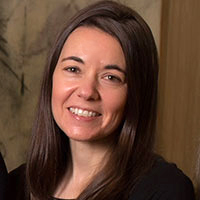Study shows prenatal education increases adherence to breastfeeding best practices
December 5, 2018
“Evaluation of Ready, Set, BABY: A Prenatal Breastfeeding Education and Counseling Approach,” the findings of a team led by researchers at the UNC Gillings School of Global Public Health, was published online Sept. 6 in the journal Birth.
Kathy Parry, MPH, project director, and Kristin P. Tully, PhD, research associate in maternal and child health, both based at the Gillings School’s Carolina Global Breastfeeding Institute (CGBI), are lead authors of the study. Co-authors include maternal and child health alumni Lorenzo N. Hopper, PhD, and Paige E. Schildkamp, MPH, and the late Miriam H. Labbok, MD, MPH, who was emeritus professor and founding director of CGBI.
Scientific evidence strongly supports exclusive breastfeeding as optimal feeding for the first six months of life, with continued breastfeeding for two years or beyond. However, current United States breastfeeding rates are far below recommended levels for initiation, exclusivity and duration of breastfeeding. Given that, the research team examined the efficacy of Ready, Set, BABY (RSB), an educational program designed to counsel women about maternity care best practices.
This evidence-based curriculum, developed by international board-certified lactation consultants at CGBI and N.C. Women’s Hospital, is a conversation-based counseling approach about maternity care best practices and the benefits and management of breastfeeding.
“The objective,” Parry said, “is to meet women where they are and build on their strengths, to enable informed decision making and realization of women’s health goals.”
To assess the impact of RSB, which may be tailored to suit the needs of diverse populations and medical settings, the research team invited to participate in the study health care workers who had downloaded RSB materials from the CGBI website.
Collaborators at seven facilities – two in Puerto Rico, four in North Carolina and one in Louisiana – agreed to participate. These study sites included a variety of settings – a community clinic, health department clinic, hospital-affiliated clinic, and a private childbirth education workshop not affiliated with a facility. The educators who provided RSB had various professional roles, including physician, physician resident, registered dietitian, nurse and lactation professional.
Patients were recruited within the research sites by the collaborators. Prior to participating in the program, women who agreed to participate completed a questionnaire that collected sociodemographic information. The questionnaire also assessed the strength of each woman’s infant feeding intentions, comfort with the idea of formula feeding, and knowledge about Baby-Friendly maternity care practices and early infant feeding cues.
After completing RSB, participants completed a questionnaire that addressed acceptability of breastfeeding and again asked the pre-RSB questions regarding infant feeding and maternity care practices. Six of the seven collaborating sites mailed back a total of 416 pre- and post-questionnaires.
Consistent with their hypotheses, the researchers found that the RSB curriculum was acceptable to mothers and that the vast majority would recommend the program to a friend. RSB participation also increased mothers’ knowledge regarding Baby-Friendly maternity care practices and early feeding cues, while strengthening their intentions for breastfeeding initiation, exclusivity and duration.
The findings are consistent with previous study findings that prenatal breastfeeding education is an effective strategy for improving breastfeeding intentions.
“RSB is a tool for empathic, human connection around optimal infant feeding and supportive maternity practices,” Tully said.
The RSB materials are free and available in both English and Spanish. (French and Arabic versions are coming soon.) The program is visually based, with a flip-chart curriculum, paired with a booklet and digital file. The noncommercial resource fulfills the education requirements for step three of the Ten Steps to Successful Breastfeeding, policies and procedures supported by the World Health Organization and UNICEF for use in facilities that provide maternity and newborn services.
Contact the Gillings School of Global Public Health communications team at sphcomm@listserv.unc.edu.


